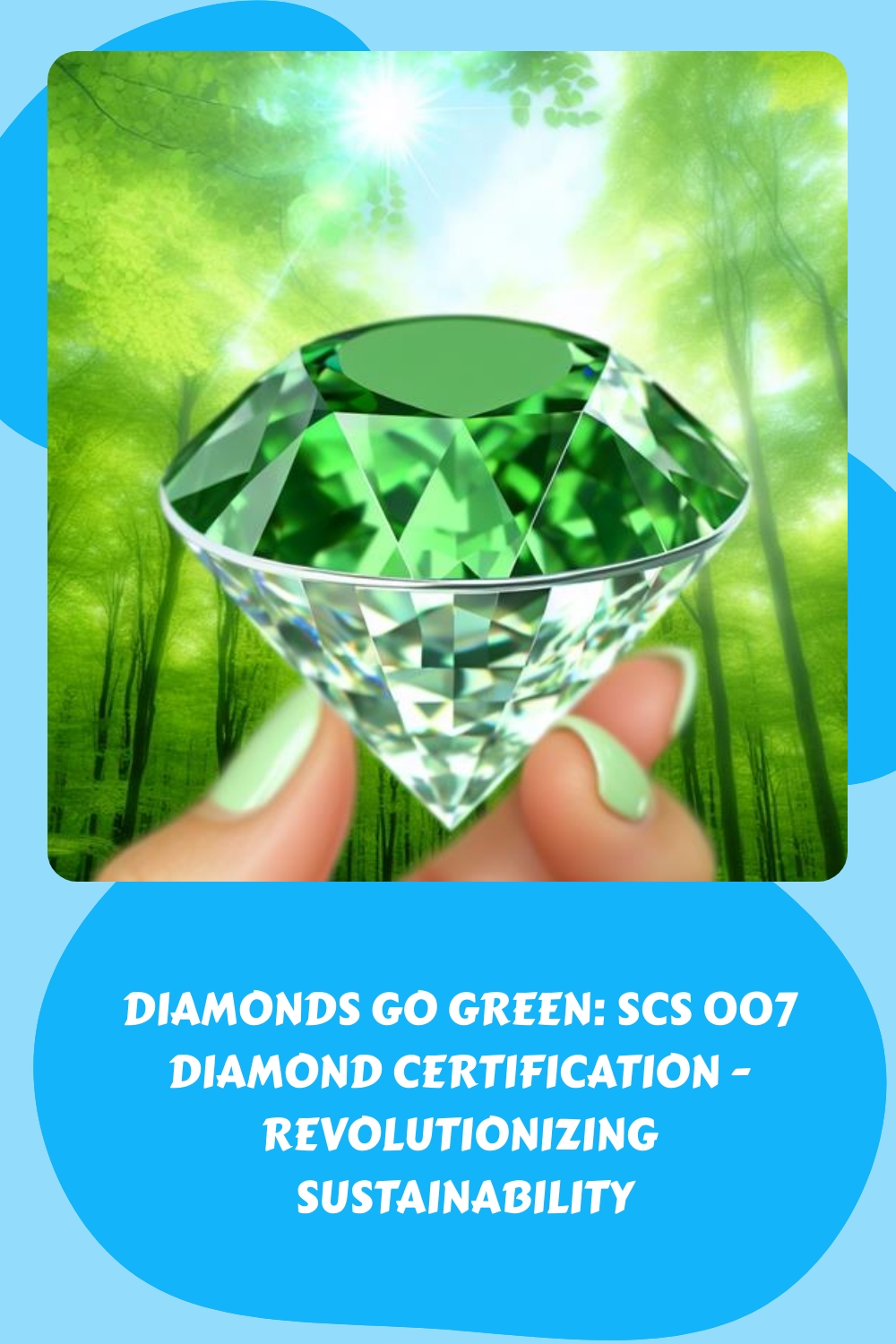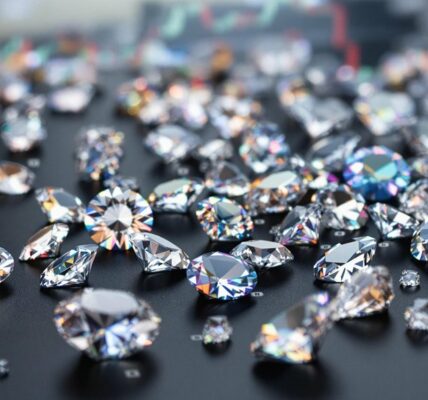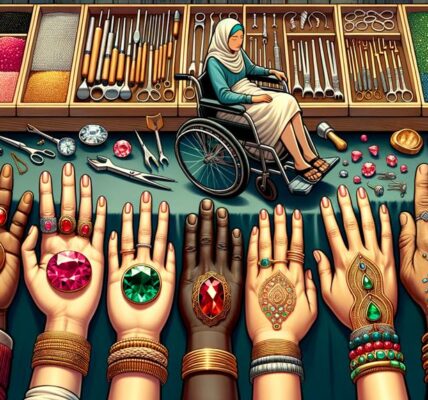Diamonds Go Green: SCS 007 Diamond Certification – Revolutionizing Sustainability
The diamond industry stands at the vanguard of an eco-conscious revolution, steadfast in its commitment to ethical and sustainable practices. This pivotal shift is accentuated by the adoption of SCS 007 Sustainability Rated Diamonds, a comprehensive standard that ensures diamonds are responsibly sourced and handled. The industry’s dedication to achieving climate neutrality is evident in its rigorous pursuit to offset carbon emissions. By embracing third-party certifications, particularly the SCS 007 standard, the industry fortifies consumer confidence and bolsters its own integrity, effectively countering greenwashing. These initiatives and stringent sustainability criteria, such as verified origin traceability and support for eco-friendly production methods, signify a profound leap towards environmental stewardship and ethical transparency. As consumers increasingly seek to reflect their personal values in their acquisitions, the diamond industry’s embrace of SCS 007 Sustainability Certification becomes a cornerstone in the narrative of luxury that harmonizes with the principles of responsibility and sustainability.
Article Contents
- 1 Key Takeaways About SCS 007 Diamond Certification
- 2 Sustainable Practices Overview
- 3 The Role of Third-Party Certification
- 4 Comprehensive Sustainability Standards
- 5 Pillars of Sustainable Diamond Production
- 6 Benefits of SCS 007 Certification
- 7 Frequently Asked Questions
- 8 Conclusion
- 9 Further Reading About SCS 007 Diamond Certification
Key Takeaways About SCS 007 Diamond Certification
- Industry adopting Verified Sourcing to ensure diamonds are ethically obtained.
- Emphasis on Climate Neutrality, reducing carbon footprint for a sustainable future.
- Third-party certifications, like SCS 007, verify claims of sustainability and ethics.
- Advancing sustainable production practices, minimizing environmental impact.
- Transparent traceability and sustainability investments support environmental and community development.
Sustainable Practices Overview
The diamond industry is facing increasing pressure to adopt ethical and sustainable practices, leading to a significant transformation in how diamonds are sourced, produced, and sold. Petra Diamonds Q1 Update shows a continued commitment to ethical sourcing and responsible mining practices, setting a positive example for the industry as a whole. Consumers are increasingly demanding transparency and accountability in the diamond supply chain, driving the need for companies to prioritize ethical sourcing and sustainable development. This shift towards ethical and sustainable practices is not only beneficial for the environment and local communities, but also for the long-term success and reputation of diamond companies.
Central to this shift is the emphasis on Verified Sourcing, a practice that guarantees diamonds are ethically obtained, respecting both human rights and the environment.
Moreover, the industry is making strides toward Climate Neutrality, committing to initiatives that offset the carbon footprint associated with diamond production.
Through these efforts, the diamond sector is not only addressing the critical concerns of environmentally and socially conscious consumers but also paving the way for a more sustainable and ethically responsible future.
This transformation underscores a growing recognition of the importance of sustainable practices in safeguarding our planet while offering consumers the freedom to choose diamonds that align with their values.
The Role of Third-Party Certification
In the quest for sustainability within the diamond industry, third-party certification plays a pivotal role by ensuring claims of ethical practices are both credible and verifiable. This certification is essential for:
- Preventing Greenwashing: It verifies that sustainability claims are not just marketing tactics but are backed by rigorous audits and testing.
- Boosting Consumer Trust: Shoppers can feel confident that their purchases align with their values regarding environmental and social responsibility.
- Enhancing Industry Credibility: It provides a standardized benchmark that all players in the industry can aspire to meet or exceed.
- Facilitating Continuous Improvement: Through regular assessment, it encourages companies to continuously enhance their sustainability efforts.
Comprehensive Sustainability Standards
Embracing rigorous sustainability standards represents a pivotal shift in the jewelry industry, setting a new benchmark for environmental and ethical accountability across the supply chain. Thorough sustainability standards are not just about making claims but ensuring that those claims are backed by solid evidence and undergo scientific validation and forensic testing. This approach grants consumers the freedom to choose truly sustainable products, knowing their authenticity and impact.
| Aspect | Importance | Method |
|---|---|---|
| Scientific Validation | Confirms claims are based on solid evidence | Rigorous scientific analysis |
| Forensic Testing | Verifies the origin and integrity of materials | Advanced forensic techniques |
| Consumer Freedom | Provides transparent information for informed choices | Detailed sustainability reporting |
This table encapsulates the essence of adopting meticulous sustainability standards, marking a significant stride towards genuine accountability and freedom of choice in the jewelry sector.
Pillars of Sustainable Diamond Production
Sustainable diamond production hinges on four fundamental pillars, each crafted to guarantee the industry advances towards greater environmental responsibility and ethical transparency. These pillars serve as the backbone of a revolution in the diamond industry, aiming to align it with the desires of consumers who value freedom and sustainability.
- Verified Origin Traceability: Secures every diamond’s journey from mine to market is transparent, promoting ethical sourcing practices.
- Climate Neutrality: Focuses on minimizing the carbon footprint of diamond production and implementing strategies for offsetting emissions.
- Sustainable Production Practices: Advocates for methods that have minimal environmental impact, aiming for net-zero operations.
- Sustainability Investments: Supports initiatives that contribute to environmental protection and community development, reinforcing the industry’s commitment to global well-being.
Benefits of SCS 007 Certification
The SCS 007 Certification brings numerous advantages to the diamond industry, including enhanced credibility and consumer trust. It embodies the freedom to choose diamonds that align with one’s values, fostering consumer confidence by ensuring the diamonds meet rigorous environmental and ethical standards.
This certification serves as a beacon of transparency, allowing consumers to make informed decisions based on scientifically validated claims regarding the environmental impact of their purchases. Additionally, it reassures individuals that their choice contributes to sustainable practices, reducing the ecological footprint of diamond production.
Frequently Asked Questions
How Can Consumers Verify a Diamond’s Sustainability Credentials?
Consumers can verify a diamond’s sustainability credentials through ethical sourcing and heightened consumer awareness. By seeking diamonds with third-party certifications, such as the SCS 007 Certified Sustainability Rated Diamonds, individuals guarantee their purchases meet rigorous environmental and social standards.
These certifications provide objective, scientifically validated claims, enhancing transparency and trust. Additionally, consumers should research jewelry producers’ sustainability practices and commitments to ethical sourcing, further safeguarding the integrity of their diamond purchases.
Are Sustainable Diamonds More Expensive Than Traditional Ones?
The question of whether sustainable diamonds are more expensive than traditional ones is influenced by market trends and production costs. Sustainable practices often involve additional steps for ethical sourcing and environmental preservation, potentially increasing costs.
However, growing consumer demand for sustainability is driving efficiency improvements and cost reductions. Over time, as sustainable practices become more integrated into production, the price gap between sustainable and traditional diamonds may narrow, reflecting broader industry shifts towards sustainability. As more consumers prioritize sustainability, the demand for ethically sourced and environmentally friendly products will continue to drive growth in the labgrown diamond market. This may result in more competition and innovation within the industry, leading to further price reductions for lab-grown diamonds. In the coming years, as technology and production processes continue to improve, it is likely that the price gap between lab-grown and traditional diamonds will continue to shrink, making sustainable options more accessible to a wider range of consumers.
How Does Forensic Testing of Diamonds Work?
Forensic testing of diamonds employs advanced techniques such as gem identification and spectral analysis to verify their origin and authenticity. This rigorous process involves examining the physical and chemical properties of diamonds to confirm they align with those of their purported sources.
Spectral analysis, in particular, allows scientists to identify unique characteristics and trace elements in diamonds, providing a scientific basis for validating their geographical origins, thereby enhancing transparency and trust in the diamond industry.
Can Old Diamonds Be Certified as Sustainable?
Yes, old diamonds can indeed be certified as sustainable through processes involving recycled facets and vintage certification. This enables the reevaluation of previously mined diamonds under modern sustainability standards.
What Happens if a Diamond Fails Sustainability Certification?
If a diamond fails sustainability certification, it faces significant market implications, potentially diminishing its value and attractiveness to ethically-minded consumers.
Producers may explore recycling options to recover value, reprocessing the diamond to meet sustainability standards.
This process underscores the importance of adhering to rigorous environmental and ethical practices from the outset, as it directly impacts the diamond’s marketability and the industry’s commitment to sustainable development. This commitment can be seen in the recent decisions made at the Kimberley Process Intersessional Meeting, where member countries discussed and adopted measures to strengthen the certification scheme for rough diamonds. By promoting transparency and accountability in the diamond supply chain, the Kimberley Process seeks to prevent the trade of conflict diamonds and support responsible sourcing practices. This collaborative effort demonstrates the industry’s dedication to ensuring that diamonds are mined, cut, and sold in a way that benefits both the environment and the communities involved.
Conclusion
In conclusion, the adoption of SCS 007 Certified Sustainability Rated Diamonds, which emphasizes the diamond industry’s embrace of sustainability, marks a significant turn towards social responsibility and environmental stewardship.
Through the implementation of thorough, internationally recognized standards and the pivotal role of third-party certification, the industry is making significant strides in establishing transparency, reducing environmental impact, and enhancing consumer trust.
This evolution not only signifies a commitment to ethical practices but also heralds a new era of sustainable luxury.
Further Reading About SCS 007 Diamond Certification
(1) Certification Standard for Sustainability Rated Diamonds | SCS Standards. https://www.scsstandards.org/standards/scs-007-sustainability-rated-diamonds
(2) SCS-007 – Diamond: SUSTAINABILITY RATED DIAMONDS. https://sustainabilityrateddiamonds.com/about/
(3) SCS 007 Sustainability Rated Diamonds, SCS Global Services. https://www.scsglobalservices.com/resources/scs-007-sustainability-rated-diamonds
(4) SCS-007: The Jewelry Sustainability Standard, SCS Global Services. https://www.scsglobalservices.com/news/scs-007-the-jewelry-sustainability-standard
(5) SCS-007: The Jewelry Sustainability Standard—Professional Jeweller. https://www.professionaljeweller.com/the-sustainable-standard-from-scs-global/






